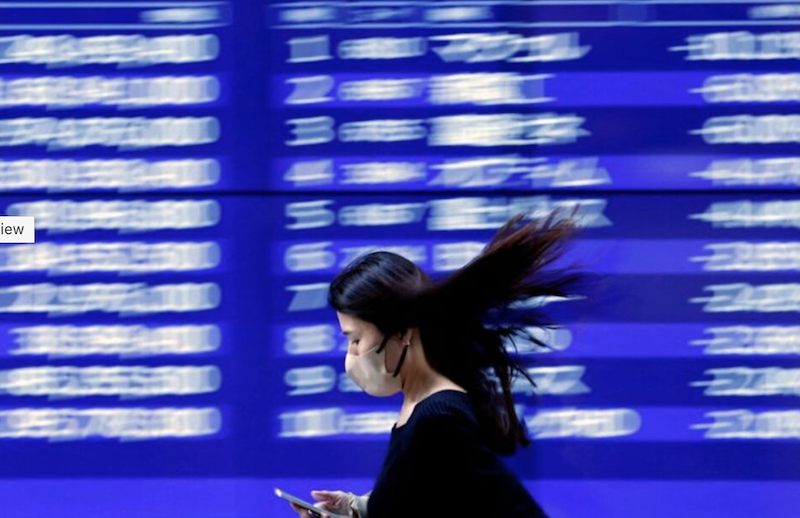Asia’s major stock markets took different turns on Friday after a shock Bank of Japan policy move and pledges of support for China’s ailing property sector.
The yen gained in volatile trade and stocks and bonds dropped in Tokyo after the Bank of Japan made another baby step away from years of ultra-loose monetary policy, while hopes for stimulus had Chinese stocks heading for their best week of the year.
The Bank of Japan maintained its super-low interest rates but shifted slightly on yield curve control, saying its 0.5% limit on 10-year government bond yields was now a “reference” and offered to buy such bonds at 1% in the market instead.
Also on AF: Raimondo Admits China Tech Export Curbs Will Hurt US Firms
The Nikkei share average dropped 0.40%, or 131.93 points, to close at 32,759.23, while the broader Topix was down 0.20%, or 4.53 points, to 2,290.61.
The BoJ’s shift caps a big week for central banks, with interest rate rises in the US and Europe in recent days seen as the final moves in the most aggressive hiking cycle in a generation.
It could also have seismic implications for global money flows, since a cheap yen that’s been inexpensive to borrow has been a mainstay of capital market funding for years and it now faces upward pressure from rising Japanese yields just as global rates seem to peak.
Ten-year Japanese government bond yields hit a nine-year high of 0.575%, with financial stocks surging in anticipation of higher rates.
The yen which had gained for days on speculation of a BoJ move, was choppy after the announcement, before gaining to hit a week-high of 138.05 to the dollar.
Politburo Pledges Boost Tech, Property
Meanwhile, across the East China Sea, China stocks jumped and were on course for the best week since last November, after the country’s top leaders pledged in a Politburo meeting to roll out further policy support to aid economic recovery.
Real estate and financials shares led the gains, after China’s housing minister urged efforts to strengthen the sector.
The Shanghai Composite Index rose 1.84%, or 59.25 points, to 3,275.93, while the Shenzhen Composite Index on China’s second exchange was ahead 1.23%, or 24.89 points, to 2,052.62.
Tech giants listed in Hong Kong advanced 2.2%, and have gained roughly 8% for the week, boosted by the promises of support for the private sector.
The Hang Seng Index gained 1.41%, or 277.45 points, to close at 19,916.56, and the Hang Seng China Enterprises Index climbed 2.07%.
Elsewhere across the region, in earlier trade, Singapore and Taipei were also up but Sydney, Seoul, Wellington, Manila, Mumbai and Jakarta fell.
MSCI’s broadest index of Asia-Pacific shares outside Japan rose 0.2% and was heading for a weekly gain of more than 2%.
US Dollar Advances
S&P 500 futures rose 0.3% with help from after-market gains driven by profits at Intel. European futures were flat and FTSE futures down 0.3%.
Ten-year US Treasury yields, which had climbed overnight on stronger-than-expected US data and talk of Japan’s tweak, stayed above 4%.
The US dollar was broadly stronger, especially against the Australian dollar – down 0.6% to $0.6666 – which was weighed after retail sales suffered their biggest fall of the year in June, suggesting less need for another rate hike.
Earlier in the week, the European Central Bank raised rates by 25 basis points to a 23-year high, as expected, but President Christine Lagarde sent the euro tumbling with talk of a pause in September.
On Wednesday, the Fed had also hiked by 25 bps and investors were cheering a glimpse of the fabled “soft landing” for the economy as the central bank no longer forecasts a recession.
Brent crude oil futures slipped slightly from three-month highs to $83.90 a barrel.
Key figures
Tokyo – Nikkei 225 < DOWN 0.40% at 32,759.23 (close)
Hong Kong – Hang Seng Index > UP 1.41% at 19,916.56 (close)
Shanghai – Composite > UP 1.84% at 3,275.93 (close)
London – FTSE 100 > UP 0.17% at 7,705.48 (close)
New York – Dow < DOWN 0.67% at 35,282.72 (close)
- Reuters with additional editing by Sean O’Meara
Read more:
China Deflation Risks Deepen as Sharp Pay Cuts Hit Consumption
US And EU Investors Avoid China, Opting for Emerging Markets
Nikkei Rallies on Fed Hopes; Property, Tech Lifts Hang Seng
























